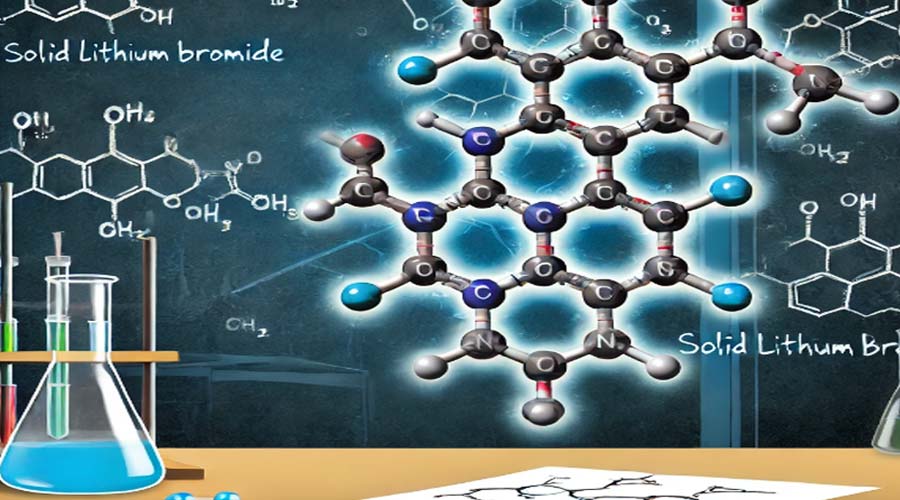In the intricate world of organic chemistry, the choice of reagents can significantly influence the outcome of a reaction. Among these, solid lithium bromide (LiBr) has emerged as a versatile and invaluable reagent in various organic synthesis processes. From oxidation and hydroformylation to deprotonation and dehydration, lithium bromide plays a pivotal role in facilitating complex chemical transformations. This article explores the multifaceted applications of solid lithium bromide in organic synthesis, underscoring its importance in advancing modern chemistry.
Table of Contents
1. Introduction to Lithium Bromide in Organic Synthesis
Lithium bromide, a white crystalline salt, is commonly known for its use in industrial applications like absorption chillers. However, its role in organic synthesis is equally noteworthy. As a reagent, solid lithium bromide is prized for its ability to act as a mild Lewis acid, facilitating a wide range of chemical reactions. Its stability, solubility in polar solvents, and ease of handling make it an attractive choice for chemists seeking efficient and reliable outcomes in their synthetic processes.
2. Oxidation: Enhancing Reaction Selectivity
One of the key applications of solid lithium bromide in organic synthesis is its use in oxidation reactions. Lithium bromide often serves as a co-catalyst, working alongside other oxidizing agents to enhance reaction selectivity and yield. In particular, it is used in the oxidation of alcohols to aldehydes and ketones, where its presence helps to suppress unwanted side reactions and improve product purity.
Example Reaction:
- Primary Alcohol Oxidation: Lithium bromide assists in the oxidation of primary alcohols to aldehydes, a crucial step in the synthesis of various fine chemicals and pharmaceuticals.
3. Hydroformylation: Facilitating Carbon-Carbon Bond Formation
Hydroformylation, also known as the oxo process, involves the addition of a formyl group (–CHO) to an alkene, resulting in the formation of aldehydes. Lithium bromide is employed as an additive in this process to stabilize the catalytic intermediates, thus improving reaction efficiency and selectivity. The use of lithium bromide in hydroformylation is particularly valuable in the production of aldehydes that serve as precursors to alcohols, acids, and esters.
Benefits of Using Lithium Bromide:
- Increased Catalytic Efficiency: Lithium bromide stabilizes reactive intermediates, leading to higher yields.
- Enhanced Selectivity: The reagent helps in achieving a more selective conversion, minimizing the formation of by-products.
4. Deprotonation: Aiding in Base-Catalyzed Reactions
In organic synthesis, deprotonation is a fundamental step in many base-catalyzed reactions. Lithium bromide, when used in combination with strong bases like lithium diisopropylamide (LDA), facilitates the deprotonation of weak acids, enabling the formation of carbanions. These carbanions are key intermediates in various carbon-carbon bond-forming reactions, including alkylation and aldol condensation.
Applications in Synthesis:
- Alkylation Reactions: Lithium bromide aids in the formation of stable carbanions, which then undergo alkylation to form new carbon-carbon bonds.
- Aldol Reactions: It enhances the deprotonation step, leading to more efficient and selective aldol condensations.
5. Dehydration: Promoting the Elimination of Water
Dehydration reactions, which involve the elimination of water from a molecule, are essential in the formation of alkenes, ethers, and anhydrides. Solid lithium bromide is an effective reagent for promoting dehydration, particularly in the synthesis of ethers from alcohols. Its ability to function under mild conditions makes it an ideal choice for sensitive substrates that may degrade under harsher conditions.
Notable Example:
- Ether Formation: Lithium bromide is used to dehydrate alcohols, leading to the formation of symmetrical or unsymmetrical ethers, which are important intermediates in the synthesis of pharmaceuticals and agrochemicals.
6. Advantages of Using Solid Lithium Bromide in Organic Synthesis
The use of solid lithium bromide in organic synthesis offers several advantages:
- Mild Reaction Conditions: Lithium bromide enables reactions to proceed under relatively mild conditions, preserving sensitive functional groups.
- Versatility: It is applicable across a wide range of reactions, including oxidation, hydroformylation, deprotonation, and dehydration.
- Improved Selectivity: The reagent helps in achieving high selectivity, reducing the formation of undesired by-products.
7. Frequently Asked Questions (FAQs)
Q1: What role does solid lithium bromide play in organic synthesis?
A1: Solid lithium bromide serves as a versatile reagent in various reactions, including oxidation, hydroformylation, deprotonation, and dehydration, enhancing selectivity and efficiency.
Q2: How does lithium bromide improve oxidation reactions?
A2: Lithium bromide acts as a co-catalyst, improving reaction selectivity and yield by stabilizing intermediates and suppressing side reactions.
Q3: Can lithium bromide be used in base-catalyzed reactions?
A3: Yes, lithium bromide is often used in combination with strong bases to facilitate deprotonation, enabling the formation of carbanions for carbon-carbon bond formation.
Q4: What are the benefits of using lithium bromide in hydroformylation?
A4: Lithium bromide enhances the efficiency and selectivity of hydroformylation reactions by stabilizing catalytic intermediates, leading to higher yields and fewer by-products.
Q5: Why is lithium bromide preferred for dehydration reactions?
A5: Lithium bromide promotes dehydration under mild conditions, making it suitable for synthesizing sensitive molecules that might otherwise degrade.
8. Conclusion
Solid lithium bromide is a powerful and adaptable reagent that plays a crucial role in advancing organic synthesis. Its applications in oxidation, hydroformylation, deprotonation, and dehydration highlight its versatility and effectiveness in facilitating complex chemical transformations. For chemists seeking to optimize their reactions and achieve higher selectivity, lithium bromide remains an indispensable tool in the synthetic toolbox.
For further details on lithium bromide and its applications in organic synthesis, visit the Lithium Bromide Products page or contact Honrel Company for customized solutions tailored to your specific needs.









